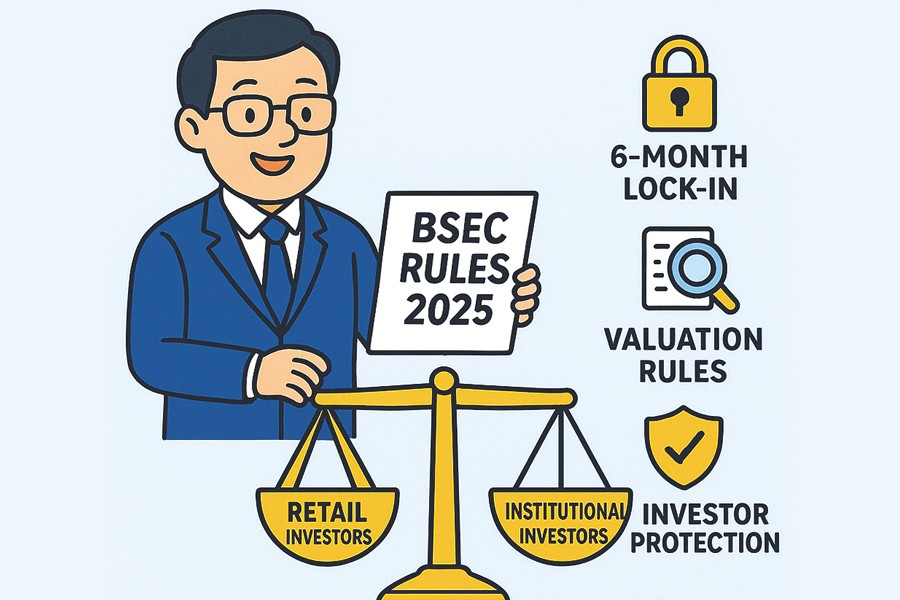BSEC seeks to remove IPO discounts for retail investors, tighten valuation

Published :
Updated :

The revised public issue rules propose the removal of the provision that allows retail investors to purchase primary shares at a discount to the cut-off price determined by eligible investors (EIs) through institutional bidding.
The market watchdog has sought public opinion on the drafted rules titled “Bangladesh Securities and Exchange Commission (Public Offer of Equity Securities) Rules, 2025,” designed not only to attract new listings but also to protect investors from fraud and scams.
The proposal to abolish the discount facility targets initial public offerings (IPOs) floated under the book-building method. In such cases, all investors, including retail ones, would purchase IPO shares at the cut-off price, while shares bought by eligible investors through bidding would remain locked in for six months, meaning they would not be available for sale during that period.
As per the existing IPO rules, general investors can avail themselves of IPO shares at a minimum 10 per cent discount to the cut-off price.
“Issuer companies always want to sell shares at a premium. They are not interested in issuing shares at discounts unless the shares have been overvalued during bidding,” said Md. Abul Kalam, spokesperson of the Bangladesh Securities and Exchange Commission (BSEC).
“So, there is no logic behind offering shares to general investors at discounts,” he added.
Besides, the provision of discounts was not in the public issue rules until 2019.
Although EIs will have to comply with the six-month lock-in period if the revised rules come into effect, no such restriction will be there for general investors. “So, this is an advantage for them,” said Mr Kalam.
The existing rules allow companies to list either under the fixed-price method or the book-building method. The fixed-price method requires companies to issue primary shares at the face value of Tk 10 each.
The new rules would allow companies to disburse shares at premiums only if the valuation is done as prescribed by the rules.
The scope for premium issuance exists even under the fixed-price method because, as Mr Kalam put it, holding roadshows and other associated procedures to raise capital under the book-building method is not viable for many companies.
“But they demand premiums. In that case, the company’s valuation will have to be done by set methods,” he said.
However, the offer price will not exceed the net asset value (NAV) per share—at historical cost or current cost.
NAV based on historical cost is determined without revaluation of a company's assets, while NAV based on current cost is calculated after revaluation of the assets.
Initially, the regulator had considered NAV based on historical cost as the highest offering price of IPO shares. But then it occurred to them that some companies might claim that the value of their assets had increased over time. So, NAV based on current cost would also be taken into account.
The offer price ceiling is aimed at keeping investors protected from overvaluation of shares.
The BSEC, in fact, wants to discourage listings under the fixed-price method as the book-building method is widely used across the globe.
That is why the regulator has suggested another restriction — companies’ post-IPO paid-up capital should not surpass Tk 1 billion if primary shares have been disbursed at a premium under the fixed-price method.
Price determination under book-building method
Issuer companies and issue managers hold roadshows in preparation to go public under the book-building method.
The regulator, in the new rules, has kept a provision for determining indicative prices.
At least 45 eligible investors from three categories — stock dealers, asset management companies and portfolio managers — will quote prices at which they would be willing to purchase shares.
Another at least 10 eligible investors from three groups of institutions other than the ones mentioned above will also quote indicative prices and the number of shares they would purchase.
On receipt of indicative prices from those institutions, the issuer company and the issue manager will settle on a price supported by the valuation methods. This price can be the mean, median or mode of the prices quoted by the institutions.
Then the company will submit its IPO proposal along with a prospectus to the commission and the stock exchanges. Both exchanges will scrutinise the IPO proposal, and the BSEC will approve the price of shares upon receiving positive reports from the bourses.
There will be a price band so that EIs can bid for shares at 25 per cent up or down from the price approved by the regulator.
The cut-off price shall be determined at the nearest integer of the lowest bid price at which the intended capital will be collected from EIs.
On the lock-in period, Mr Kalam said institutions showed a tendency to offload shares immediately after the listing of a company under the book-building method.
Many institutions have also quoted irrational prices during the bidding of primary shares. They are mainly institutional brokers or mutual funds helping issuers achieve a higher market value than they deserve in exchange for illicit gains.
Therefore, the time restriction would keep institutional investors from inflating share prices.
mufazzal.fe@gmail.com


 For all latest news, follow The Financial Express Google News channel.
For all latest news, follow The Financial Express Google News channel.